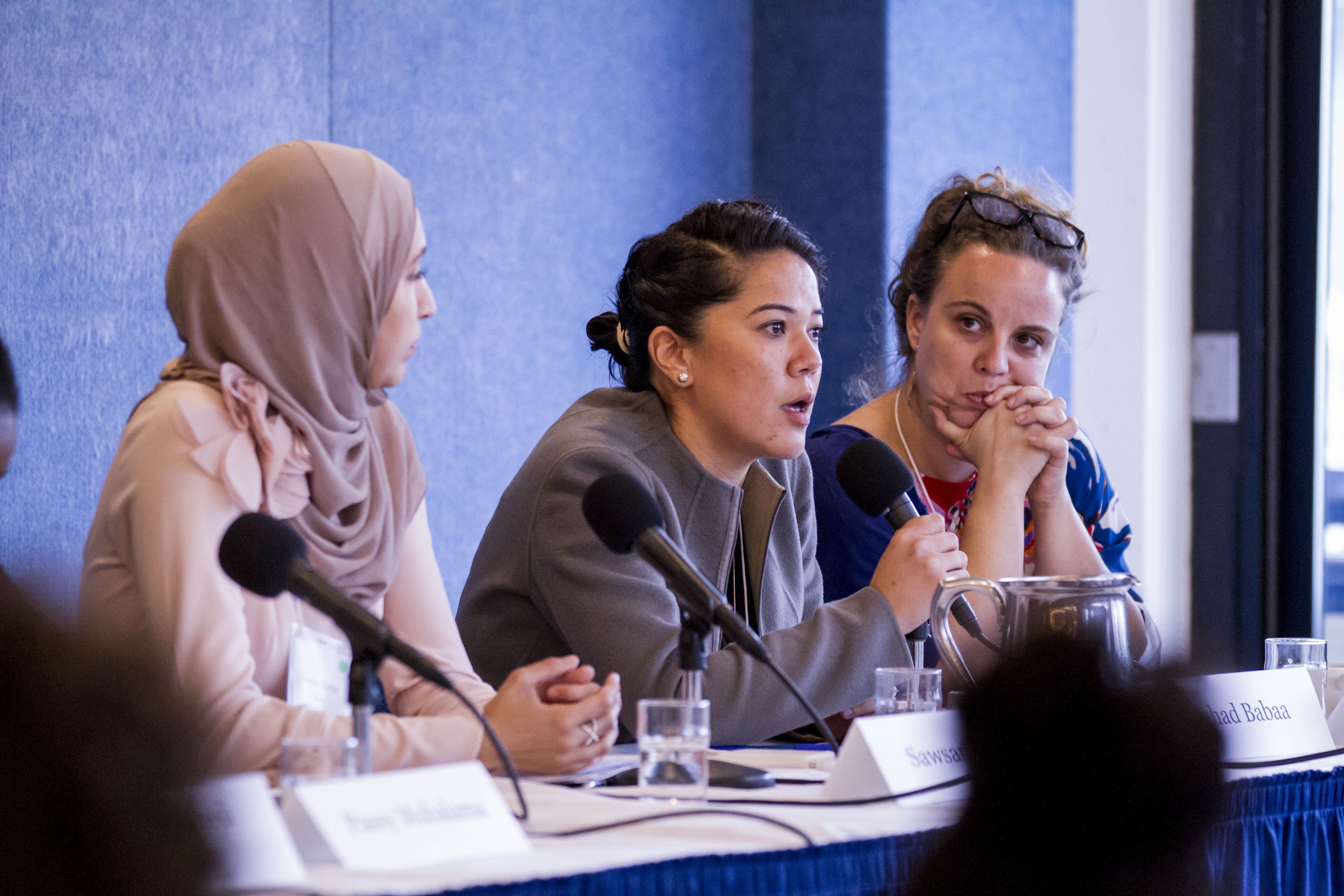Jina Moore, East Africa bureau chief for The New York Times, moderated the panel “From the Ground Up: Building Peace Outside the Halls of Power” during the two-day “Beyond War: Causes of Conflict, Prospects for Peace” conference held at the National Press Club.
Speaking of peacebuilding, Moore said, “It’s easy to forget that we’re talking about a really brave and powerful and transformative, imaginative act that ordinary people are trying to undertake in their places every day at extraordinary risk."
Each panelist has lived and worked in geographically and culturally diverse regions. Yet, each one provided personal stories of brave individuals who, with little outside recognition, diligently work to build peace in their communities.
Many times journalists just spend time with experts. You need to be in the community, says @PassyMubalama in From the Ground Up panel #BeyondWar pic.twitter.com/gfW9myd0cl
— Kem Sawyer (@kemsawyer) June 2, 2018
“I would like to tell you a story,” said Passy Mubalama, founder and executive director of Action and Development Initiative for the Protection of Women and Children (AIDPROFEN), as she spoke of a 35-year-old woman from Buhumba, an area in eastern Democratic Republic of Congo affected by conflict for decades. She was married with multiple children. After a sexual assault by armed rebels, she became pregnant. Stigma made her afraid to tell her husband, and when he learned what had happened he left her and the children to fend for themselves.
“When you are a victim of sexual violence, many times you are rejected by your family, husband, and by people in the community,” Mubalama said.
AIDPROFEN offered the woman support and job training so that she could have the skills to provide for herself and her children. The staff also worked to reconcile the husband with his family. The wife went on to become an activist herself, educating her community about sexual and gender-based violence.
Sawsan Morrar, 2017 Pulitzer Center-UC Berkeley student fellow, reported on Syrian refugees seeking mental health therapy in Amman, Jordan. Morrar found that many Syrian refugees were making efforts to help one another and maintain a sense of agency.
“Yes, a lot of these people were very traumatized and they were struggling,” said Morrar, “But when I got there I realized they didn’t identify themselves as victims.”
While in Jordan, Morrar continued to encounter people who were choosing to rebuild their lives and tell their own narratives. This diverts from the expected narrative of refugees who are passive in their situation and victims of circumstance.
When @sawsan24 wanted to understand mental health of Syrian refugees in Jordan, she thought she'd have to go to the Zataari camp -- but there were so many refugees living in the city, she found new voices and amazing grassroots self-help outside the 'usual' spaces #beyondwar
— Jina Moore (@itsjina) June 2, 2018
“I know I’m needed here,” Morrar said, quoting a Syrian refugee in Jordan who gave up the opportunity to seek asylum in North America in order to help other Syrian refugees.
Hassan Ghedi Santur, a freelance journalist and novelist who won the War Stories Peace Stories “Pitching for Peace” competition with a project on the rehabilitation of former Al-Shabab fighters, spoke outside peacebuilders approach Somalia.
“Somalia is kind of like the poster child for how not to build peace,” Santur said, describing the numerous states, NGOs, and international organizations that have attempted to intervene and build Somalia into a stable, democratic state. “They forgot to actually include locals and local peacebuilders and people who have historically been marginalized. For instance women and youth.”
"They were child soldiers essentially" and yet there's still deep suspicion about young men who manage to get out of Al Shabaab after their forcible recruitment, says @hgsentur, whose reporting also asked, what next? #BeyondWar
— Jina Moore (@itsjina) June 2, 2018
Veronica Zaragovia, a freelance journalist, also a winner of the “Pitching for Peace” competition, will report on the shifting dynamic between Colombia and FARC.
"As a reporter, I have an opportunity to tell stories of people on the ground rather than this discourse being thrown out" by the men occupying positions of political power, says @verozaragovia #BeyondWar
— Jina Moore (@itsjina) June 2, 2018
She has interviewed former FARC members about what a future of peace would look like, something that even a few years ago was impossible to imagine.
“I like to consider that rather than when all the reporters are running in one direction, which is usually reporting on what the politicians are saying, we are going to be going in the opposite direction and seeing who are the people whose stories are far more compelling and will help to explain Colombia and its history and where it’s going,” Zaragovia said.
What happens when we change the characters of a story... how does that impact human-made solutions to human-made conflicts? — @smbabaa @JustVisionMedia #changingnarratives talktowomen #BeyondWar @pulitzercenter
— Jennifer Koons (@jenkoons) June 2, 2018
Suhad Babaa, executive director of Just Vision, an organization that documents and disseminates the stories of Palestinian and Israel grassroots leaders, emphasized the importance of having a diverse range of narratives and not looking only to the expected framing of important issues: “What that does in our understanding as audiences is that it tells us a couple of really troubling things. It tells us that there is nothing we can do about this, that this is intractable. And it also makes invisible the very actors on the ground who are doing extraordinary work and whose work can, when amplified, really gain traction and influence and inspire others to join in constructively.”
